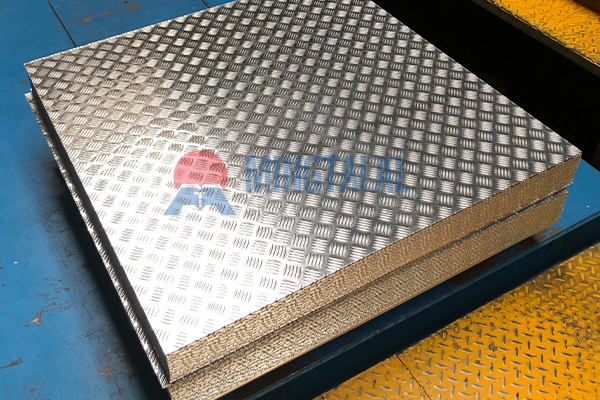Stock code: 601677
Stock code: 601677
Aluminum tread plate (where price serves as a key procurement consideration), also called diamond plate or checker plate, features raised patterns that enhance slip resistance while offering exceptional load-bearing capacity and corrosion resistance. This material sees extensive use across industrial and construction sectors—from truck bed linings and anti-slip flooring to ship decks and machinery platforms. Its pricing fluctuates based on aluminum ingot market rates, manufacturing complexity, and order specifications, with significant cost variations across alloy types.
Market-available tread plates fall into three primary categories, each with distinct performance and cost characteristics:
– Features: Cost-effective 1060 aluminum base with good weather resistance and formability.
Applications: Cold storage flooring, packaging, and low-stress anti-slip surfaces.
– Pricing: The most economical option due to simple alloy composition.
– Features: Manganese-enhanced for improved strength and moderate rust resistance, though less durable than premium alloys.
– Applications: Truck trailer beds, warehouse shelving where heavy corrosion resistance isn’t critical.
Pricing: Moderately higher than standard alloy but remains cost-efficient.
– Features: 5000-series alloys with superior corrosion resistance, hardness, and fatigue strength for harsh environments.
– Applications: Marine decks, chemical plant flooring, and offshore structures.
– Pricing: Highest among the three due to advanced alloy content and processing demands.
– Specialized surface treatment prevents oxidation and fading, minimizing maintenance costs even in outdoor exposure.
– 30% lighter than steel with comparable strength, reducing structural load in transport and construction.
– Supports cutting, bending, welding, and finishes like anodizing/powder coating for diverse industry needs.
– 100% recyclable, aligning with green manufacturing standards to reduce carbon footprint.
Beyond aluminum ingot prices, these variables impact costs:
– Pattern Complexity: Dense or custom patterns increase machining expenses.
– Order Volume: Bulk purchases typically qualify for discounts.
– Logistics: Remote deliveries or special packaging incur added fees.
For real-time aluminum checker plate price comparisons, consult suppliers like Mingtai Aluminum. Most manufacturers offer tailored solutions—adjusting alloy ratios, thickness, and surface treatments to optimize cost-efficiency.
